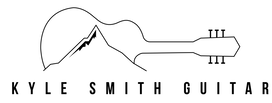|
Arpeggios are an important skill to develop for all jazz guitar players.
They are a foundation of jazz language and being able to navigate different chord changes that pop up in songs. Arpeggios for jazz guitar can also be a real point of frustration as you get going. It can seem like there's tons you have to do. Because on the surface, you can look and find hundreds of variations on different ways to play arpeggios all over the neck. And it can seem really, really difficult for you to put any of this to use. All you have to do is go on reddit up and look up jazz guitar arpeggios, and you'll find a laundry list of things you're somehow supposed to get under your fingers. Because supposedly you have to do X, Y and Z before you're allowed to play jazz guitar. It really doesn't have to be that bad. This topic of arpeggios comes up in my jazz guitar lessons all the time, especially when I'm talking to newer or self taught jazz guitar players who've been trying to learn online. So today, let's look at a different approach to learning your arpeggios and what you can realistically expect from practicing them and just a few different tweaks to make this a little bit more manageable for your practice.
0 Comments
 The Dorian mode is a minor scale used frequently in jazz guitar playing. It is the second mode of the major scale, and is can be called either the Dorian mode, or the Dorian minor scale. Your Dorian mode is typically used for improvising on minor 7th chords. Specifically, this is the scale used for the "2" chord in 2 5 1 and other common diatonic chord progressions. You'll also use it for modal jazz tunes that are written around the Dorian mode - like So What and Impressions. If you're learning jazz guitar, you need to know how to play this scale in any key, and anywhere on the guitar fretboard. Here's the good news - if you've been playing guitar for very long, you likely have the raw tools to be able to play this scale already. You just need to be able to think, play, and hear these tools as the Dorian mode. 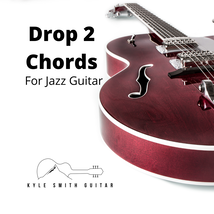 Drop 2 chords are an important part of any jazz guitar players chord vocabulary, and introduce new sounds into your guitar playing. These chords give you a tighter finger pattern than drop 3 chords do, and have sometimes been called block chords, and other names over time - but Drop 2 is the name we use today. Drop 2 chords are particularly helpful on guitar because they let you put the top note of your chord on the 1st string, or the second string. This opens up more range for your chord playing, helps you accompany soloists better, and makes it easier to harmonize melodies for solo guitar playing. Learning your drop 2 chords will also introduce new stretchy chord shapes, and expand your chord vocabulary. 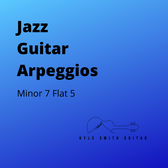 Minor 7b5 arpeggios are an important part of every jazz guitar players tool kit. These arpeggio shapes let you outline minor 7b5 chords as you improvise and play melodies and and important part of the minor 2 5 1 progression. Minor 7b5 arpeggios are based off of a minor-type finger pattern, meaning that the shape is related somehow to the minor pentatonic scale. In fact, the minor 7th arpeggio is only two notes different than your minor pentatonic scale. 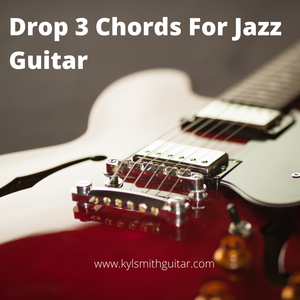 If you're learning to play jazz guitar, drop 3 chords are an important chord shape for you to become familiar with. These chord shapes can help you build a foundation of jazz guitar chord knowledge that will serve you well for years. Drop 3 chords are relatively finger friendly, and they sound good in a variety of situations:
As you become more advanced, these chords can also help you develop the ability to walk bass lines up and down the neck as you play the chords to a song. Lots of people become familiar with one or two of these Drop 3 chord shapes as they begin learning jazz guitar, but never learn the whole system. This leads many aspiring jazz guitarists to become stuck with root position chords, and limited in their chord vocabulary. Learning the whole system (only 4 shapes) will help you to:
These things start to happen automatically as you become accustomed to playing with your Drop 3 chords. 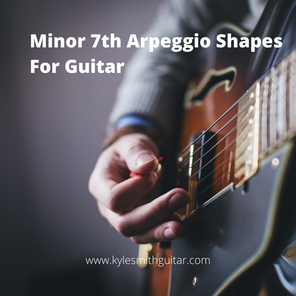 Minor 7th arpeggio shapes are important for every guitar player to know. These arpeggio shapes help you outline minor 7th chords in songs you are playing, improve your finger control, and are fun to work on. If you already know your minor pentatonic scale shapes, this is going to be an easy skill for you to learn. Minor 7th arpeggios go with minor 7th chords. If you're trying to improvise over an Am7 chord, you would play an Am7 arpeggio. All you need to know is where to find an A on your fretboard, and then play the matching minor 7th arpeggio shape. Arpeggios are like playing chords, but doing it one note at a time like with your scale patterns. You can use these arpeggio shapes to play solos, melodies, or riffs. 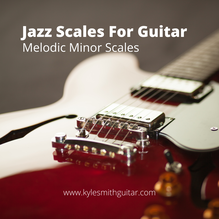 Modes are an important, and often confusing topic you are guaranteed to come across when learning jazz scales on guitar playing . Sometimes, modes are treated as some kind of holy grail that will magically make your guitar playing better once you understand how they work and know their names. Other times, mode scale patterns are brushed aside as almost unnecessary, and mostly ignored. In this lesson we'll talk about modes of the major scale, and how you can use these jazz scales in your own guitar playing. We'll talk about the common problems that come up when people start talking about modes in jazz, learn two simple approaches to thinking about modes, and find out how to use modes to play solos on jazz standards, and outline chord changes. 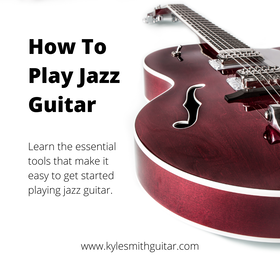 When it comes down to it, I really love playing jazz guitar. Playing jazz guitar is fun, challenging, and rewarding all at the same time. Playing jazz gives you a way to express yourself musically, explore your creativity, and enhance your knowledge of music theory and the guitar fretboard. I've been hooked on jazz guitar ever since I found out there was a band at school that I could play guitar in. I joined the jazz band and have been playing jazz ever since. While at first learning jazz guitar was just a way to get to play guitar at school, it soon became a lifelong study of this amazing style of music. When you're new to jazz, it can seem like there is a ton of learning that you need to do before you even start to play jazz guitar. (Let alone playing entire songs!) This isn't necessarily true - Learning how to play jazz guitar requires the same basic guitar playing skills as any other style of music. If you take it one step at a time, you can absolutely learn how to play jazz guitar - you just have to learn to apply your guitar playing skills to this great style of music.  Arpeggio patterns are a useful skill for any guitar player. These patterns help you outline chords in your solos, improve your technical skills, and can help you master the guitar fretboard as you learn them. Dominant 7th is the full name of a chord quality that you are probably already familiar with, whether you realize it or not. A G dominant 7th chord symbol would be G7. Most of us have learned these simply as "7th chords" - I'm going to be a little more specific in this lesson because there are different types of "7th chords" that you might learn later on. With arpeggio patterns, you are playing the notes from a chord one at a time - almost like a scale pattern. If you play a G7 arpeggio, you are playing a G7 chord in a way that you can use for playing melodies, riffs, or guitar solos. These arpeggio patterns will challenge your fingers to move in new ways, adding a new layer to your technical skills and abilities. By playing these arpeggio patterns from different starting notes on each string, you can play in any key, anywhere on the guitar fretboard. Dominant 7th arpeggio patterns are found in many musical styles, including jazz, rock, blues, country, and other popular styles. No matter what kind of music you want to play, these arpeggio patterns will come in handy.  Major scales are important for all guitar players to learn. These patterns form the foundation of our musical system - knowing your major scales will open up many more possibilities for what you are able to play and understand in music. For guitar players, knowing how to play major scales can help you master the fretboard, play by ear, and develop your technique. Most of our music theory works in relation to the major scale, so working with these patterns will give you the tools you need so you can understand music better, and communicate with other musicians. These scales are important for every style, and if you want to learn to play jazz guitar, learning your major scales is an essential first step. |
